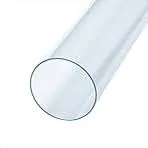Aug . 06, 2024 09:46 Back to list
HDPE Sewer Pipe Advantages and Applications in Modern Drainage Systems and Infrastructure Projects
The Benefits and Applications of HDPE Sewer Pipes
High-Density Polyethylene (HDPE) sewer pipes have emerged as a highly preferred choice in the construction and infrastructure sectors, especially in drainage and sewer systems. Known for their exceptional strength, flexibility, and resistance to corrosion, HDPE pipes offer a multitude of advantages that make them ideal for both underground and above-ground applications.
One of the most notable features of HDPE pipes is their incredible durability. Made from high-density polyethylene, they can withstand extreme temperatures and harsh environmental conditions without succumbing to damage. Unlike traditional materials such as concrete or clay, HDPE pipes are non-brittle and do not crack easily, ensuring a longer lifespan for drainage systems. They are designed to last for over 50 years under normal operating conditions, making them a smart investment for municipalities and construction projects.
The Benefits and Applications of HDPE Sewer Pipes
Corrosion resistance is critical for sewer applications, where pipes are constantly exposed to moisture and various chemicals. HDPE pipes are not susceptible to rust or chemical degradation, unlike metal or concrete counterparts. This property ensures that the pipes maintain their integrity over time, contributing to more reliable sewer systems that require less maintenance and repair. Additionally, the smooth interior surface of HDPE pipes minimizes friction, promoting better flow rates and reducing the likelihood of blockages due to buildup.
hdpe sewer pipe

From an environmental perspective, HDPE pipes are also more sustainable than traditional materials. They can be made from recycled materials, and their production has a lower carbon footprint compared to other pipe materials. Moreover, HDPE pipes are fully recyclable, contributing to a circular economy in the construction industry. As sustainability becomes an increasingly critical concern in infrastructure development, the use of HDPE technology aligns with modern environmental standards and goals.
In terms of applications, HDPE sewer pipes are versatile. They are used in various sectors, including municipal, agricultural, and industrial applications. In municipal settings, they facilitate stormwater drainage and sewage transport, significantly enhancing urban infrastructure. In agriculture, they are employed for irrigation and drainage solutions, helping to manage water efficiently. Industrial applications often involve asset protection and fluid transport, showcasing the adaptability of HDPE pipes across different fields.
In conclusion, HDPE sewer pipes represent a significant advancement in piping technology. Their unmatched durability, flexibility, corrosion resistance, and eco-friendliness make them an ideal choice for modern infrastructure needs. Whether for municipal sewer systems or agricultural drainage, the advantages of HDPE pipes are clear. As cities expand and infrastructure demand increases, incorporating HDPE technology can lead to more resilient and sustainable solutions for wastewater management.
With ongoing innovations in HDPE materials and technology, the future appears bright for the continued adoption of HDPE sewer pipes in projects around the globe. As communities strive to implement more effective and environmentally friendly sewer systems, the role of HDPE will undoubtedly become more prominent in shaping the infrastructure of tomorrow.
-
Durable Glossy PVC Rigid Sheet | Premium High-Shine Panels
NewsAug.26,2025
-
Durable PP Rigid Sheet: Lightweight, Chemical Resistant Solutions
NewsAug.21,2025
-
PVC Grey Sheet for Extraction: Chemical Resistant & Durable
NewsAug.19,2025
-
Durable PVC Pipe Fittings for Plumbing & Irrigation Needs
NewsAug.18,2025
-
HDPE Steel Belt Reinforced Spiral Corrugated Pipe | High Strength
NewsAug.17,2025
-
HDPE Pipe Fittings: Durable, Leak-Proof Solutions
NewsAug.16,2025

